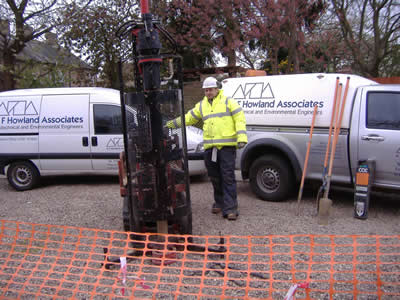
Rotary Drilling
Powered rotary cutting tools use a cutter head on the end of a shaft, which is driven into the ground as it rotates. The system requires lubrication (air, water or drilling mud) to keep the cutting head cool and remove the soil or rock which has been cut through. The lubricant lifts the debris from the cutting head up the borehole and ejects the material at ground level. There are two types of rotary drilling, open-hole and core drilling. Material recovered from open-hole drilling is mixed with the drilling fluid. It is not suitable for effective sampling and it is often difficult to observe and record the strata. This method is only suitable for the rapid formation of a hole to enable sampling at a greater depth by an alternative method or for the installation of monitoring wells. Core drilling is carried out using wire-line, double or triple-tube core barrels with diamond or tungsten-tipped core bits. Wire-line core barrels are rotated from the surface by rods normally of the same diameter as the outer core barrel. The core is brought to the surface within the inner barrel on a small-diameter wire rope or line which is attached to an ‘overshot’ recovery tool. This system is particularly suitable for superficial or weak deposits, as any vibration from the drilling action is minimized due to the closefitting rods within the hole. The conventional double-tube core consists of two barrels; the outer one is rotated by the drill rods and carries the coring bit. The inner barrel does not rotate, and the core cut by the coring bit passes up into this inner barrel, enabling the core to be recovered and brought to the surface. With triple-core barrels, the non-rotating inner barrel contains a removable sample tube or liner. At the end of each run, this liner with the core it contains is extracted and stored in a core box. This method does not increase core recovery but is more likely to preserve the core in its original condition. |
Call 01603 250754 or click here to send an enquiry by email
